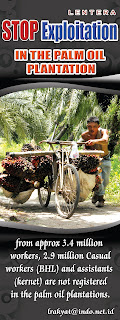Labors without
rights in The Palm Oil Plantations
The key finding of a research done in 2011 by several NGOs in Indonesia shows that there is
a systematic effort of the LSP (Large Scale Plantation) to obscure the administration
of labor. It derives many other impacts, including hindering the labor to access
normative rights, children workers, properly protected, and undecent
wages. Little protest by the labors could bear punishment such laid
off, simply said that the legality of the labor is a major prerequisite for a worker to be able to access their rights.
Research estimates that in the large scale plantations, an estate (in some places is called
"division") consists of 600 hectares to 1000 hectares, with SKU Permanent Workers) and BHL (Casual Workers) of 250 to 300 people,
not including the Kernet (undocumented assistants or helpers). If the area of LSP nation wide covers 4 million hectares, it can be estimated that the number of SKU and BHL workers are as many as 1.2 million
people, not including helper. All workers, estimated to have at least one helper,
so that the total minimum number of workers in the LSP is as much as 2, 4 million people across Indonesia.
Child labor contained in the undocumented and
unregistered BHL and the assistants. If only 50 percent of the helper consists of
the children, then the number of child laborers nationwide
at least as many as 600,000 people. If the entire palm plantations both
LSP and non-corporate
and small farmers counted, then child labor will reach
millions of people.
Saurlin Siagian

Tidak ada komentar:
Posting Komentar